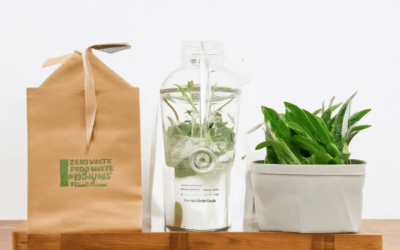Embracing a low-waste lifestyle has become increasingly important in today’s world, as more individuals seek sustainable ways to live in harmony with the environment. A low-waste lifestyle isn’t just about reducing clutter—it’s about making intentional choices that minimize your ecological footprint while enhancing your daily life. Whether you’re looking to cut down on plastic use, reduce energy consumption, or simply live more mindfully, there are countless strategies to adopt. This guide will walk you through practical steps to transition to a low-waste lifestyle, offering tips, tricks, and inspiration to help you reduce waste in every area of your life. From understanding the basics of a low-waste lifestyle to exploring creative ways to reuse and recycle, this comprehensive guide will provide you with everything you need to get started. By making small, consistent changes, you can enjoy a more sustainable and fulfilling life while making a positive impact on the planet.
Key Takeaways
– Embrace a zero-waste lifestyle to reduce household waste and contribute to a sustainable future.
– Practice the 5 Rs of zero-waste living: Refuse, Reduce, Reuse, Repurpose, and Recycle.
– Extend your efforts beyond the home by supporting local businesses and advocating for sustainable policies.
– Enjoy cost savings and environmental benefits while minimizing waste.
– Start small and stay consistent to transition smoothly into a low-waste lifestyle.

How to Live a Low Waste Lifestyle
We all want to make a positive impact on the planet, and reducing waste is a great place to start. Living a low-waste lifestyle doesn’t mean drastic changes—it’s about small, consistent steps that add up over time. Here’s how you can begin:
1. Reduce Waste at Home
Start by examining your daily habits and identifying areas where waste can be minimized. For instance:
- Maintain a waste-free kitchen by composting scraps and using reusable containers.
- Shop smartly by buying bulk quantities and avoiding single-use items.
- Reuse household items instead of discarding them. For example, use old jars for storage or turn scrap paper into notepads.
2. Shop Consciously
When shopping, choose products that come in recyclable or compostable packaging. Look for local businesses or zero-waste stores that offer refill options for household essentials:
- Bring your own containers to fill with nuts, bolts, and other small items.
- Purchase products made from sustainable materials, such as organic cotton or bamboo.
3. Compost at Home
Composting is a simple yet effective way to reduce waste and enrich your soil. Start by gathering organic scraps like fruit peels, coffee grounds, and eggshells. You can then:
- Build or buy a compost bin to store your scraps.
- Turn the pile regularly to aerate it and speed up decomposition.
- Add the finished compost to your garden or plants to provide nutrients.
4. Get Involved in Your Community
Reducing waste isn’t just a personal effort—it’s something we can all do together. Consider joining local initiatives or groups focused on sustainability:
- Participate in clean-up drives or beach cleanups in your area.
- Join a zero-waste group on social media for tips and support.
- Support policies that promote sustainable living through your local government or NGOs.
By taking these steps, you’ll not only reduce your personal waste but also inspire others to join the movement. Remember, every small change makes a big difference!
10 Ways to Reduce Waste
Reducing waste is essential for protecting our environment and promoting sustainable living. Here are 10 effective strategies to minimize waste:
- Reduce, Reuse, Recycle:** Prioritize buying fewer items, repurpose goods, and recycle what you can’t reuse. This reduces the amount of waste sent to landfills.
- Conserve Water:** Fix leaks and only water plants when necessary. This helps conserve water and reduces unnecessary waste.
- Buy Bulk:** Purchasing in bulk reduces packaging waste and encourages buying only what you need.
- Compost Organic Waste:** Turn kitchen scraps and yard waste into nutrient-rich compost, benefiting the environment and your garden.
- Use Cloth Products:** Opt for reusable cloth products like menstrual pads and cotton wipes to reduce plastic waste.
- Minimize Single-Use Items:** Bring your own containers for takeout food and beverages to cut down on disposable packaging.
- Support Local Farms:** Buy locally-grown foods to reduce transportation emissions and packaging associated with imported goods.
- Fix It Instead of Tossing:** Repair broken items rather than discarding them, extending their lifespan and reducing waste.
- Use Digital Tools:** Opt for digital receipts and e-books to save paper and reduce physical waste.
- Participate in Waste Reduction Programs:** Join local cleanup initiatives or participate in community recycling drives to contribute to broader efforts.
Eco Planeta Verde offers comprehensive guides and resources to help you adopt these practices and learn more about sustainable living. Visit their website for additional tips and inspiration to make a positive impact on the planet.
Learn more about sustainable living at Eco Planeta Verde

The 5 Rules of Zero-Waste Living
Zero-waste living is a sustainable lifestyle approach aimed at minimizing waste generation. Here are the five essential principles guiding this movement:
- Refuse : Refrain from purchasing items that contribute to waste. Choose products made from sustainable materials and packaged minimally.
- Reduce : Minimize your consumption by adopting a minimalist lifestyle and avoiding unnecessary purchases.
- Reuse : Find creative ways to repurpose items rather than discarding them. Turn scraps into useful projects or donate to those in need.
- Recycle : Recycling is the last resort. Ensure recyclable materials are free of food residues and are collected properly to maximize their usefulness.
- Rot : Compost organic waste to return nutrients to the earth, supporting local ecosystems and reducing landfill dependency.
Adopting these principles helps reduce your ecological footprint and promotes a more sustainable way of life. By embracing zero-waste practices, you can contribute to a healthier planet for future generations.
Eco Planeta Verde encourages everyone to take small steps towards sustainability. Start by implementing one of these rules today and gradually incorporate more as you become more aware of your waste production.
For more tips and resources on sustainable living, visit our website . Discover how you can make eco-friendly choices in your daily routine and join the zero-waste movement!

What is the zero-waste lifestyle model?
The zero-waste lifestyle model is a sustainable living approach aimed at eliminating waste in all aspects of daily life. This includes reducing household waste, minimizing industrial outputs, and promoting circular economy practices. The core principles revolve around the 5 Rs: Refuse, Reduce, Reuse, Repurpose, and Recycle.
Adopting a zero-waste lifestyle involves:
- Refuse – Not purchasing items that create unnecessary waste.
- Reduce – Minimizing consumption by only buying what is necessary.
- Reuse – Finding new purposes for items before discarding them.
- Repurpose – Transforming discarded materials into new products.
- Recycle – Recycling materials that cannot be reused or repurposed.
The zero-waste lifestyle extends beyond the household to include:
- Supporting local businesses and artisans to reduce packaging waste.
- Purchasing products made from recycled materials.
- Participating in zero-waste communities and initiatives.
- Advocating for policies that promote sustainability and reduce waste generation.
Benefits of embracing the zero-waste lifestyle include:
- Cost savings through reduced consumption and reuse.
- Environmental protection by minimizing landfill waste and resource depletion.
- Personal fulfillment from contributing to a healthier planet.
To begin transitioning to a zero-waste lifestyle, consider these tips:
- Research and choose zero-waste products and services.
- Join online communities and forums for support and inspiration.
- Learn about local waste management facilities and recycling programs.
- Start small by focusing on one area of your life to gradually adopt the lifestyle.
Eco Planeta Verde encourages everyone to explore the zero-waste lifestyle and contribute to a more sustainable future. Learn more about our resources and tips for adopting greener habits here .
What are the 5 R’s of zero-waste living?
The 5 R’s of zero-waste living are essential principles that guide individuals and communities toward reducing their environmental impact. These practices foster sustainability and help minimize waste generation.
- Refuse: Refuse to buy items that you don’t truly need. Before purchasing, ask yourself if you require the product and if it’s essential. This reduces unnecessary consumption and minimizes waste.
- Reduce: Minimize your waste production by choosing fewer resources. For example, use reusable products like cloth menstrual pads instead of disposable ones, or bring your own containers to grocery stores.
- Reuse: Find creative ways to give items new life. Repurpose glass jars for storage, turn old clothing into household items, or fix broken goods rather than discarding them.
- Recycle: recycling is the final step after reducing and reusing. However, not all materials can be recycled, so learn what can be recycled in your area and dispose of hazardous waste properly.
- Rot: Return organic materials to nature through composting. This transforms kitchen scraps and yard waste into nutrient-rich soil, enriching the earth and supporting local ecosystems.
By embracing these 5 R’s, individuals can significantly reduce their waste contribution and promote a healthier planet for future generations.

Examples of Reduce
- Minimize the use of plastic bottles to reduce waste.
- Turn off lights when leaving a room to conserve energy.
- Reduce food waste by planning meals carefully and storing leftovers.
- Walk or bike instead of driving short distances to lower carbon emissions.
- Use reusable containers instead of disposable ones to decrease plastic usage.
- Adjust your thermostat to a lower temperature during winter to save energy.
- Volunteer to help clean up public spaces to reduce pollution.
- Choose locally grown fruits and vegetables to minimize transportation emissions.
- Fix leaks in pipes or hoses to conserve water resources.
By incorporating these practices into daily life, individuals can effectively contribute to reducing their ecological footprint and promoting sustainability.




0 Comments